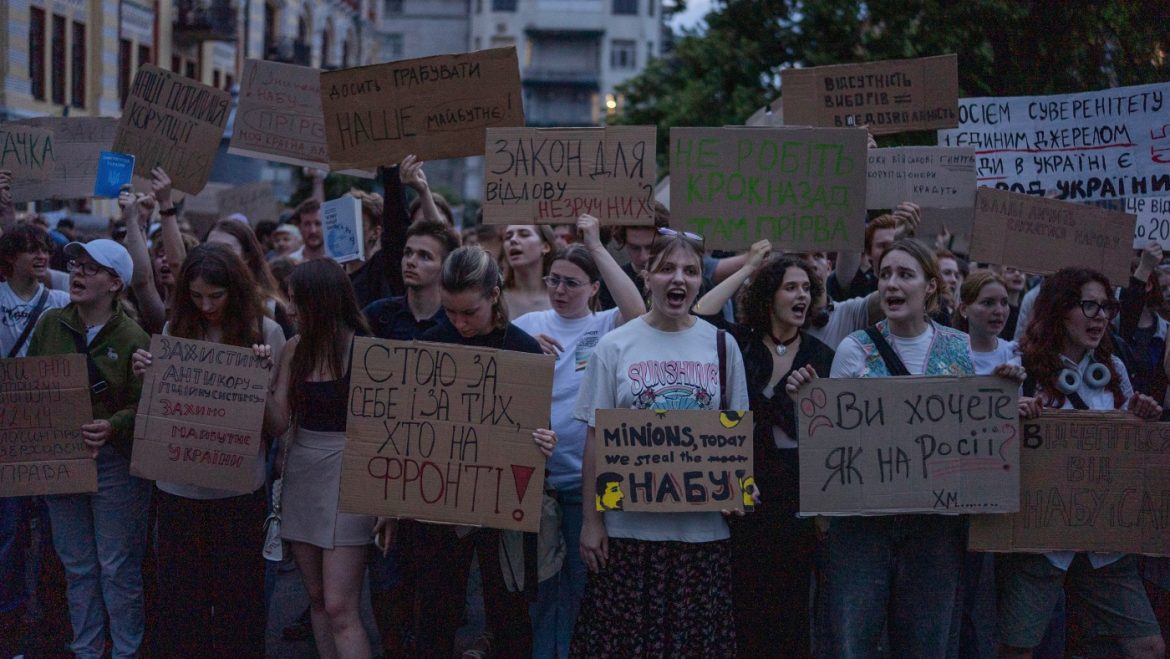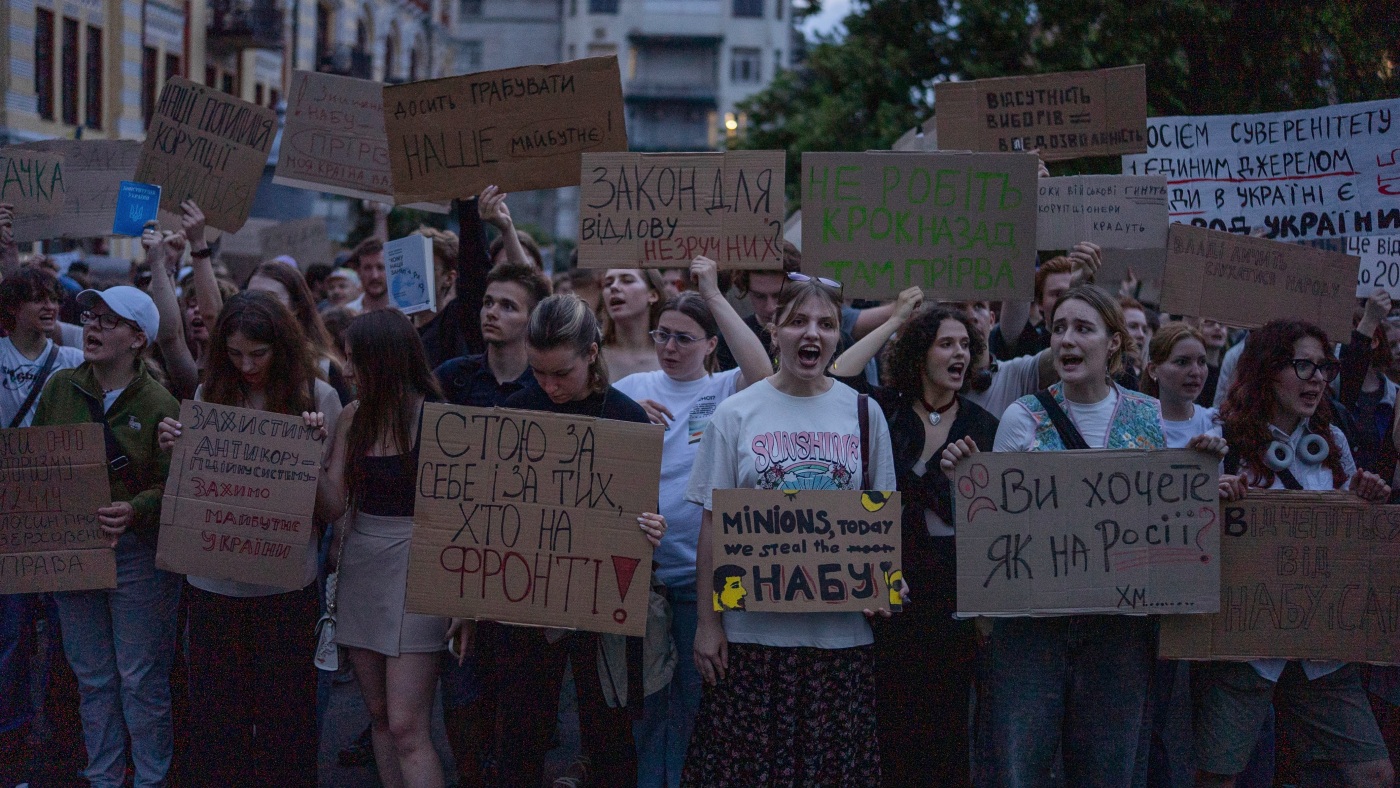The Backlash Against Anti-Corruption Measures in Ukraine: A Detailed Analysis
Introduction: A Nation at a Crossroads
Ukraine stands at a critical juncture, balancing the scales of war, reform, and democracy. The recent signing of a controversial bill by President Volodymyr Zelenskyy, which tightens oversight of key anti-corruption agencies, has sparked a firestorm of protests and international scrutiny. This legislation, intended to enhance accountability, has instead been perceived by many as a step backward in Ukraine’s fight against corruption. The ensuing backlash underscores the delicate balance between reform and resistance, as well as the profound impact of corruption on a nation’s stability and progress.
The Contentious Legislation: A Closer Look
The legislation in question introduces measures that critics argue could undermine the independence of two pivotal anti-corruption bodies: the National Anti-Corruption Bureau of Ukraine (NABU) and the Specialized Anti-Corruption Prosecutor’s Office (SAPO). The bill aims to increase oversight, but the devil lies in the details. By granting greater influence to the president’s inner circle over investigations, the law risks politicizing the agencies’ work. This perceived erosion of autonomy has raised alarm bells, with many fearing that the agencies’ ability to operate impartially will be compromised. The legislation’s proponents argue that increased oversight will improve efficiency and accountability, but the fine line between oversight and interference remains a contentious issue.
A Nation Divided: The Voice of the People
The signing of the bill has not gone unchallenged. Thousands of Ukrainians have taken to the streets in Kyiv and other cities, defying the limitations on public gatherings imposed by martial law. These protests represent a significant expression of public discontent, uniting a diverse group of civilians, war veterans, soldiers, and anti-corruption watchdogs. Their slogans, such as “Veto the law” and “Protect the anti-corruption system, protect Ukraine’s future,” reflect the depth of their concern. The protests highlight a growing divide between the government and the people, with many Ukrainians viewing the legislation as a betrayal of the reforms they have fought for. The demonstrations also underscore the resilience of Ukrainian civil society, which has consistently advocated for transparency and accountability.
The International Community Responds: A Global Concern
The international community has not remained silent on the matter. International organizations and foreign governments have expressed concern over the potential impact of the new law, emphasizing the importance of maintaining the independence and effectiveness of anti-corruption agencies. The European Union, the United States, and other key allies have underscored that these agencies are essential components of a healthy democracy. The international scrutiny underscores the global significance of Ukraine’s anti-corruption efforts, particularly in the context of its ongoing struggle against external aggression. The international community’s response also highlights the interconnected nature of global politics, where domestic reforms can have far-reaching implications.
The Argument for Reform: A Delicate Balancing Act
Proponents of the legislation argue that it is necessary to improve the efficiency and accountability of anti-corruption agencies. They contend that increased oversight will help to ensure that these bodies operate within the bounds of the law and serve the interests of the Ukrainian people. This perspective highlights the inherent tension between the need for effective anti-corruption measures and the importance of safeguarding individual rights and due process. Striking the right balance is a delicate act, requiring careful consideration of all perspectives. The debate over the legislation reflects a broader struggle to reconcile the demands of reform with the realities of governance.
The Impact on Public Trust: A Critical Juncture
The controversy surrounding the anti-corruption bill comes at a critical juncture for Ukraine. The nation is currently engaged in a fierce struggle to defend its sovereignty and territorial integrity, relying heavily on both domestic resilience and international support. Maintaining public trust in government institutions is essential for sustaining morale and ensuring the effective mobilization of resources. Any perceived weakening of anti-corruption efforts could erode public confidence and undermine the overall war effort. The legislation’s potential impact on public trust cannot be overstated, as it has the power to either strengthen or weaken the nation’s resolve in the face of adversity.
The Broader Context: Ukraine’s Fight Against Corruption
The recent protests and international criticism must be viewed within the broader context of Ukraine’s long-standing struggle against corruption. For decades, corruption has been a pervasive problem, hindering economic development, undermining the rule of law, and fueling social unrest. In recent years, Ukraine has made significant strides in establishing anti-corruption institutions and implementing reforms, but these efforts have often faced resistance from vested interests. The current controversy represents a potential setback in this ongoing battle. The fight against corruption is not just a domestic issue but a global one, as corruption undermines stability and prosperity worldwide.
The Role of Civil Society: Guardians of Accountability
Civil society organizations have played a crucial role in advocating for anti-corruption reforms and holding government officials accountable. These organizations have consistently monitored the actions of government agencies, exposed corrupt practices, and promoted greater transparency. Their efforts are essential for ensuring that anti-corruption measures are effectively implemented and that those who engage in corrupt activities are brought to justice. The new legislation could potentially restrict the ability of civil society organizations to operate freely and effectively, further undermining anti-corruption efforts. The role of civil society in Ukraine’s democratic development cannot be overstated, as it serves as a vital check on government power.
Looking Ahead: Navigating a Path Forward
As Ukraine navigates this challenging situation, it is essential for all stakeholders to engage in constructive dialogue and work towards a solution that strengthens, rather than weakens, the country’s anti-corruption infrastructure. This will require a commitment to transparency, accountability, and the rule of law. It will also require a willingness to listen to the concerns of civil society organizations, international partners, and the Ukrainian people. The future of Ukraine’s anti-corruption efforts, and indeed the future of the nation itself, may depend on it. The path forward is fraught with challenges, but it is also filled with opportunities for growth and reform.
A Pivotal Moment for Ukraine
The signing of the bill and the subsequent protests mark a pivotal moment for Ukraine. The decisions made in the coming weeks and months will have far-reaching consequences for the country’s future. Will Ukraine continue on the path towards greater transparency and accountability, or will it succumb to the forces of corruption and vested interests? The answer to this question will determine not only the fate of Ukraine’s anti-corruption efforts but also the country’s overall trajectory as a democratic and prosperous nation. The choices made today will shape the Ukraine of tomorrow, and the world is watching.


